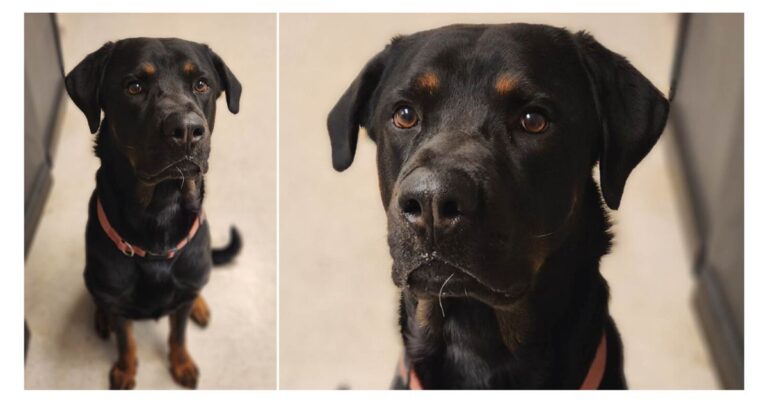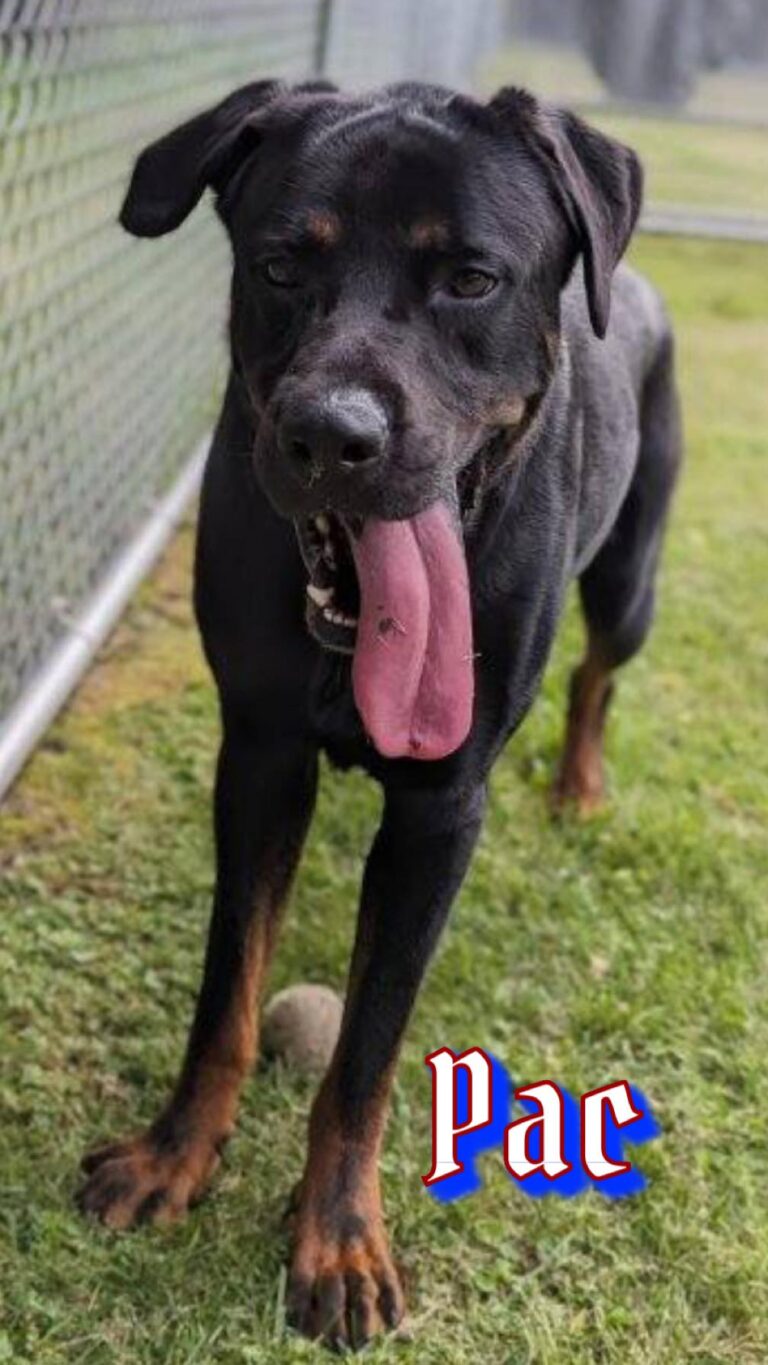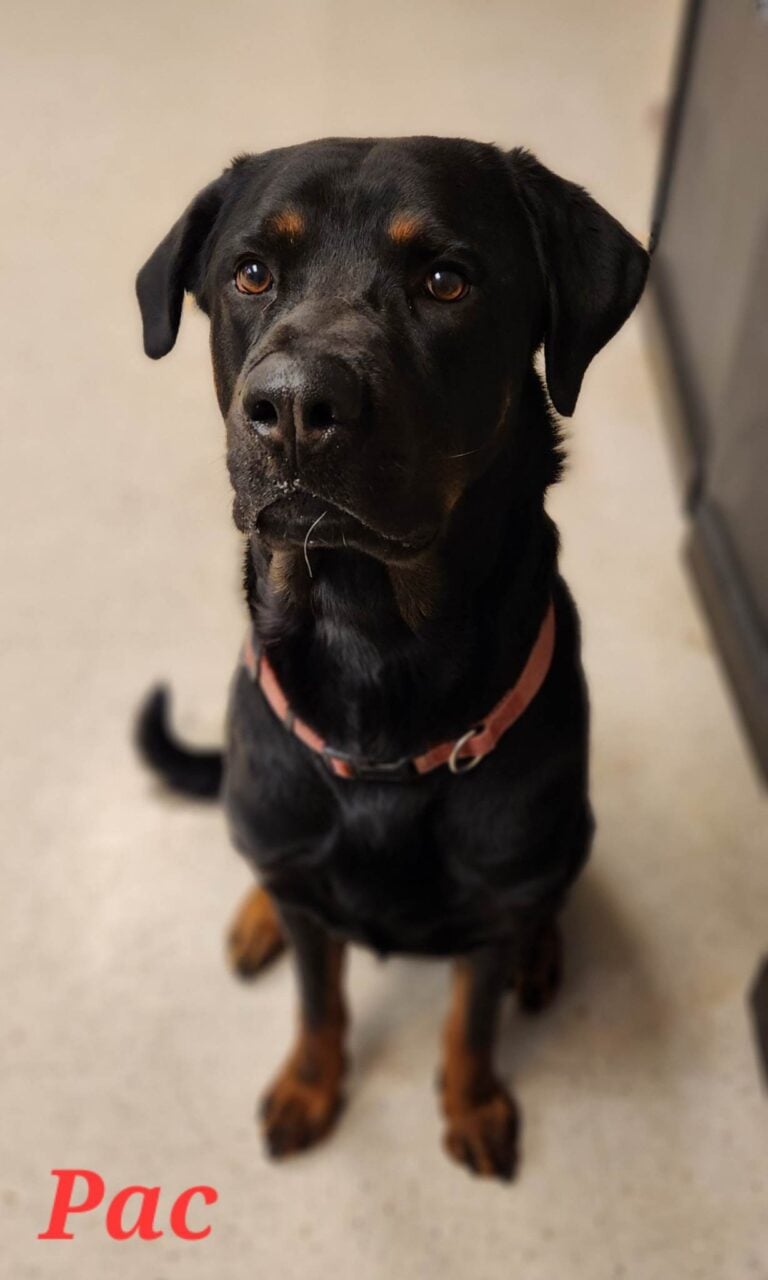Dog's Up for Adoption News & Entertainment
The Big Dog Gets Blamed for Everything: How a Chihuahua Sent a Gentle Giant to the Shelter For 300 Days & Counting
Pac, a 120 pound Rottweiler-Newfoundland mix, is stuck in a tough spot. He’s been living in a kennel at the Des Moines County Humane Society for over 300 days now, a casualty of his family’s divorce and a misunderstanding in his next home with a nippy Chihuahua. His situation really hits home about how family troubles can shake up a pet’s world. Pac’s story, with all its ups and downs, is a real eye-opener to the emotional rollercoaster pets go through during human conflicts.

“Pac was a happy guy till the divorce happened,” recounts Tiffanie Rourke, Shelter Manager at the Des Moines County Humane Society. His owners, amidst their turmoil, moved to residences where dogs weren’t allowed. Promises to reclaim him were unfulfilled, leaving Pac in a temporary home with his owner’s mother and her Chihuahuas.
The Big Dog Always Gets The Blame
The dynamics in this new home were challenging for Pac, a 120 pound gentle giant. The small dogs, as Tiffanie describes, “liked to chase him, sometimes biting at his face.” Pac, a tender-hearted colossus, mostly ignored their provocations. However, an incident where he tried to nip back at a Chihuahua led to his relocation to the shelter. “It was not vicious,” Tiffanie clarifies, “just a warning nip.” But it was enough for his temporary caretaker to make the decision to surrender him.
In the pet world, big dogs like Pac often get a raw deal. Despite their unique personalities and situations, they’re usually the first to be blamed when things go wrong, just because they’re the biggest ones around. It’s a tough break, especially for gentle giants who are just misunderstood because of their size. Big dogs seem to be held to a higher standard.
Size Apparently DOES Matter
This unfair treatment comes from the stereotype that big equals aggressive, which isn’t always true. For a dog like Pac, just trying to give a little nip back at a pesky Chihuahua landed him in hot water, without anyone really looking at the whole story. It’s a familiar scene where the big dog gets the blame, no matter what really happened. This kind of bias misses the mark on the real nature of many big dogs, who are actually gentle at heart. It’s a tough break for them, making it harder to find a family that sees past their size to the loving pet they are.
300 Days In Confinement

Pac’s prolonged stay at the Des Moines County Humane Society, spanning over 300 days since February 8th, 2023, has become a growing concern for the rescuers. Shelter life, especially for an extended period, can be taxing on any animal, and Pac is no exception.
Shelter Fatigue
‘Shelter fatigue’ is a real worry for dogs like Pac who’ve been in the shelter too long. It’s when they start losing their spark because of too much time in a kennel, not a real home. The folks at the shelter, who’ve really grown fond of Pac, are getting more and more worried about it. “He’s been with us so long, he might think this is all there is,” one of the rescuers said. It’s a race against time to find Pac a forever home where he can really let loose and be happy. The longer he’s in the shelter, the more it might chip away at his cheerful nature, which would be a real shame for such a friendly big guy.
Right now, Pac’s living in one of the bigger kennels at the shelter, because, well, he’s a hefty 120-pounder. They’re doing their best to make it comfy for him, but let’s be real – a kennel’s no match for a real home, especially for a dog as big and lively as Pac.
It’s a Life of Waiting and Watching
His daily life is pretty routine: saying hi to the shelter staff, going for walks, and running around in a fenced area to burn off energy. Sure, it’s better than nothing, but it’s just not enough for a dog like him. No matter how roomy his kennel is, it can’t give him the love, freedom, and full-on fun of a home where he’s part of the family.
It’s a life of waiting and watching, as potential adopters often pass by, intimidated by his size and the guarding behavior he exhibits in his confined space.
At the shelter, Pac’s size and his guarding behavior in the kennel often intimidate potential adopters. But beyond the kennel’s confines, he transforms into a loving, playful companion. “Once his door is opened, we are greeted with a big kiss and excitement,” says Tiffanie. This dichotomy in his behavior underscores the challenge shelters face in presenting large, misunderstood dogs like Pac to potential adopters.

Who Gets The Dog In The Divorce?
In the midst of family upheavals, particularly divorces, pets often become silent victims, a reality Tiffanie from the Des Moines County Humane Society knows all too well. “I have had the worst luck with dogs when owners split,” she shares, reflecting on the numerous cases she has encountered. The aftermath of a divorce can be chaotic and emotionally taxing, not just for the humans involved but also for their pets. Dogs, like Pac, often find themselves caught in the crossfire of custody disputes or lifestyle changes. Tiffanie’s experience reveals a disturbing trend where pets are sometimes used as pawns in marital disputes or are neglected as the estranged couple moves on, leaving the animals in a state of abandonment and confusion.
Dog Tug-of-War
Tiffanie further elaborates on the complexities surrounding pet custody in divorce situations. “Deciding ownership of a shared dog is where we [the shelter] often gets put in the middle,” she explains. The shelter frequently faces dilemmas where one party may refuse to release the pet to the other, yet neither is willing or able to provide a home for the animal.
This tug-of-war not only places an additional burden on shelters but also takes a significant emotional toll on the pets. In her two and a half years of working at the shelter, Tiffanie has witnessed firsthand the impact of such disputes on dogs like Pac. They are often left bewildered and grieving, losing not just their home but the familiarity and comfort of their family unit. These insights from Tiffanie underscore the need for more responsible and compassionate decision-making when it comes to the welfare of pets during divorces.
Pac’s Ideal World
In Pac’s ideal world, he would find a home without small pets or children, where his size and playful nature wouldn’t be misinterpreted. “A home he can sleep on a huge bed and a yard with a large fence he can run in,” imagines Tiffanie. It’s a simple wish for a dog who has endured so much.
As Pac awaits his forever home, his story serves as a poignant reminder of the silent sufferers in human conflicts. His resilience and affectionate nature, despite his experiences, speak to the forgiving and adaptable spirit of dogs. For those considering adoption, Pac represents not just a pet in need, but a chance to rewrite a story of loss into one of love and understanding.
Pac’s journey is a testament to the resilience of animals and the compassion of those who care for them in shelters. It’s a call to action for potential adopters to look beyond the surface and see the loving heart of a dog who has been a victim of circumstance. In the end, Pac’s story is not just about the challenges he faced but about the hope that one day he will find a loving home where he can thrive and be understood for the gentle giant he truly is.
Related Articles:
- 10 Year Old Pitbull Gives Birth to 15 Puppies After Being Abandoned & Surviving Cancer (Now This Mama Needs a Home!)
- Loyal Mama Dog STILL waiting for Her Forever Home after 2 1/2 Years
- Bronco’s 1,000-Day Wait: The Mystery of Why No One Will Adopt Him
